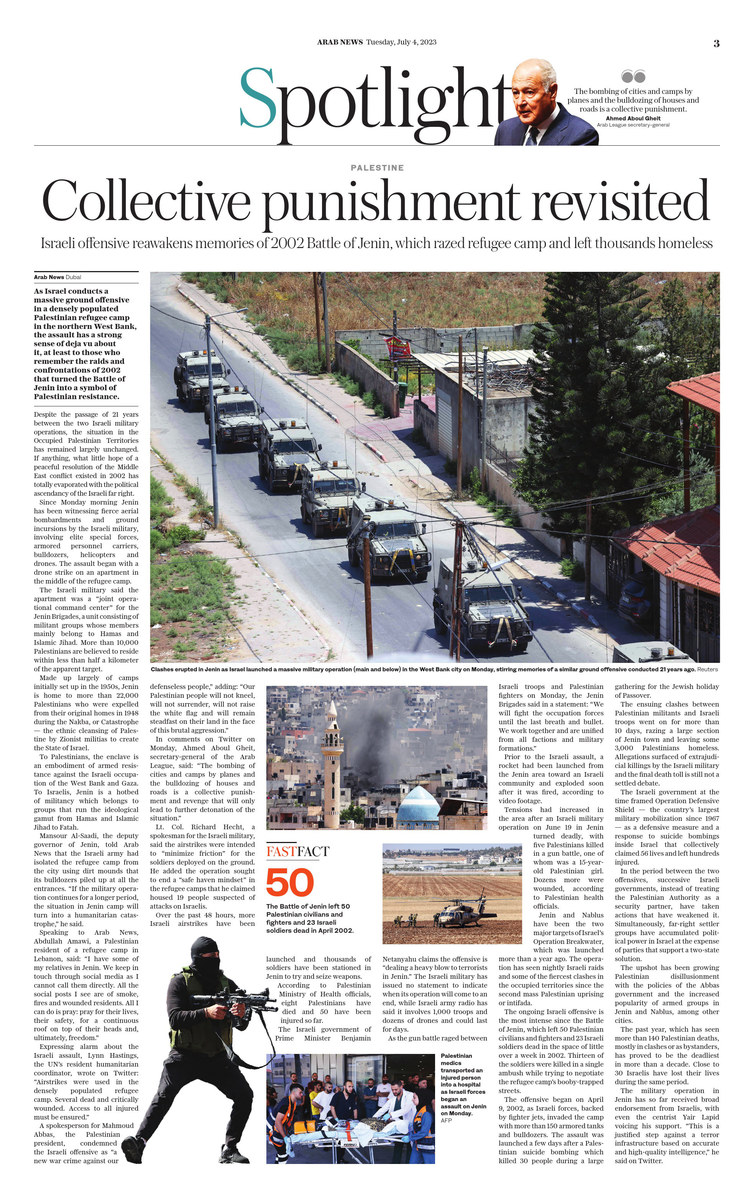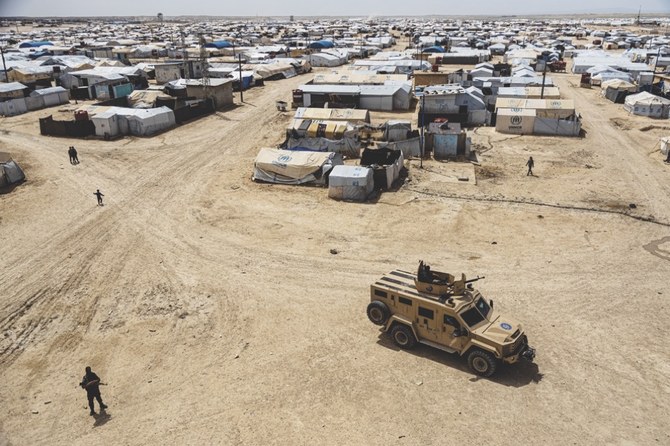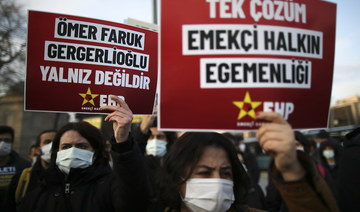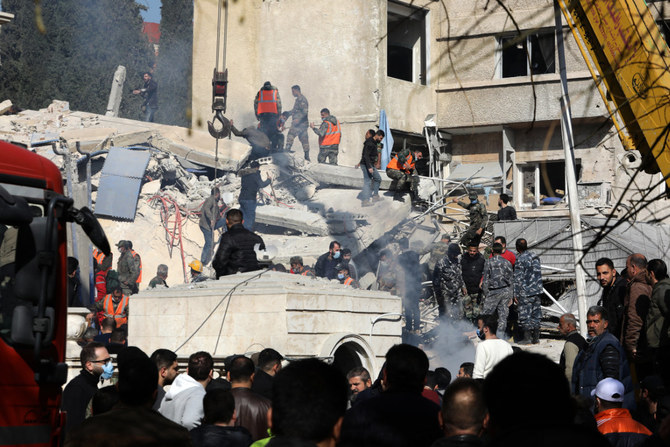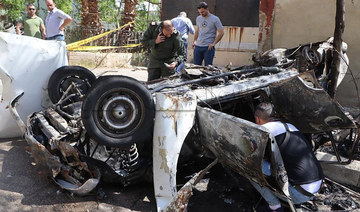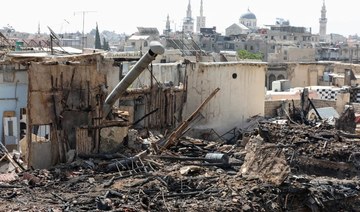DUBAI: As Israel conducts a massive ground offensive in a densely populated Palestinian refugee camp in the northern West Bank, the assault has a strong sense of deja vu about it, at least to those who remember the raids and confrontations of 2002 that turned the Battle of Jenin into a symbol of Palestinian resistance.
Despite the passage of 21 years between the two Israeli military operations, the situation in the Occupied Palestinian Territories has remained largely unchanged. If anything, the little hope of a peaceful resolution of the Middle East conflict that existed in 2002 has evaporated with the political ascendancy of the Israeli far right.
Since Monday morning Jenin has been witnessing fierce aerial bombardments and ground incursions by the Israeli military, involving elite special forces, armored personnel carriers, bulldozers, helicopters and drones. The assault began with a drone strike on an apartment in the middle of the refugee camp.
The Israeli military said the apartment was a “joint operational command center” for the Jenin Brigades, a unit consisting of militant groups whose members mainly belong to Hamas and Islamic Jihad. More than 10,000 Palestinians are believed to reside within less than half a kilometer of the apparent target.
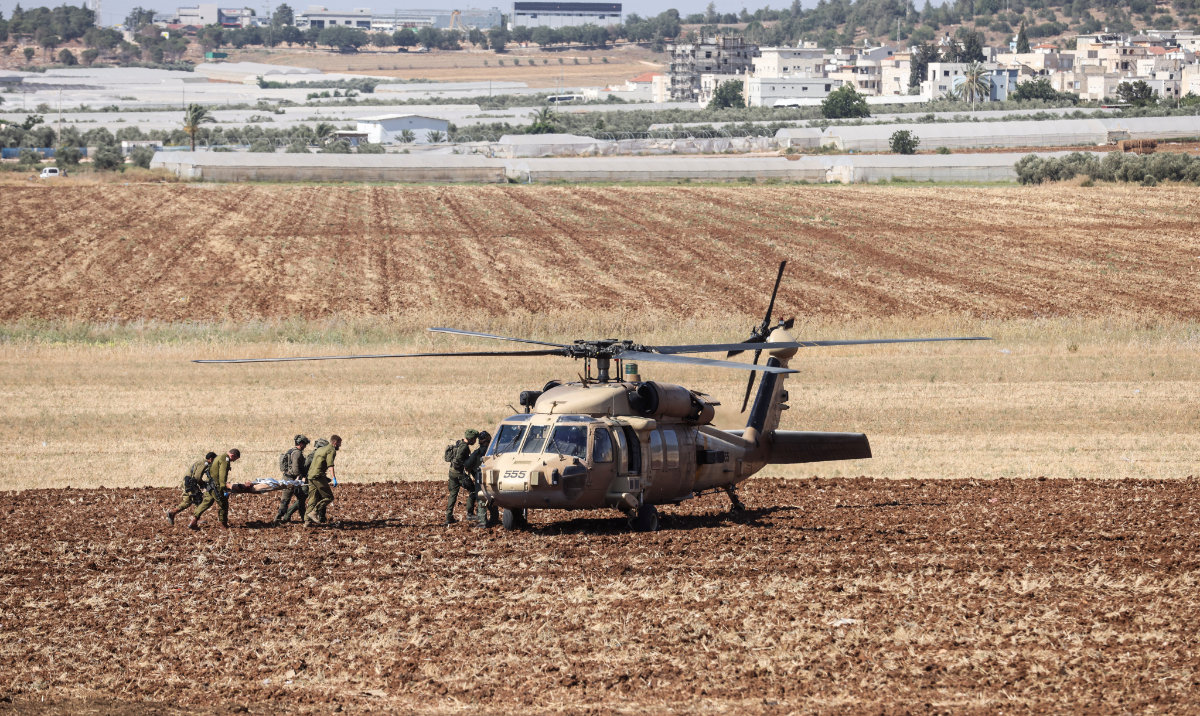
Clashes erupted in Jenin as Israel launched a massive military operation in the West Bank city on Monday, reviving memories of a similar ground offensive conducted 21 years ago. (Reuters)
Made up largely of camps initially set up in the 1950s, Jenin is home to more than 22,000 Palestinians who were expelled from their original homes in 1948 during the Nakba, or Catastrophe — the ethnic cleansing of Palestine by Zionist militias to create the State of Israel.
To Palestinians, the enclave embodies armed resistance against the occupation of the West Bank and Gaza. To Israelis, Jenin is a hotbed of militancy which belongs to groups that run the ideological gamut from Hamas and Islamic Jihad to Fatah.
Mansour Al-Saadi, the deputy governor of Jenin, told Arab News that the Israeli army had isolated the refugee camp from the city using dirt mounds that its bulldozers piled up at all the entrances. “If the military operation continues for a longer period, the situation in Jenin camp will turn into a humanitarian catastrophe,” he said.
Opinion
This section contains relevant reference points, placed in (Opinion field)
Speaking to Arab News, Abdullah Amawi, a Palestinian resident of a refugee camp in Lebanon, said: “I have some of my relatives in Jenin. We keep in touch through social media as I cannot call them directly. All the social posts I see are of smoke, fires and wounded residents. All I can do is pray: Pray for their lives, their safety, for a continuous roof on top of their heads and, ultimately, freedom.”
Expressing alarm about the Israeli assault, Lynn Hastings, the UN’s resident humanitarian coordinator, wrote on Twitter: “Airstrikes were used in the densely populated refugee camp. Several dead and critically wounded. Access to all injured must be ensured.”
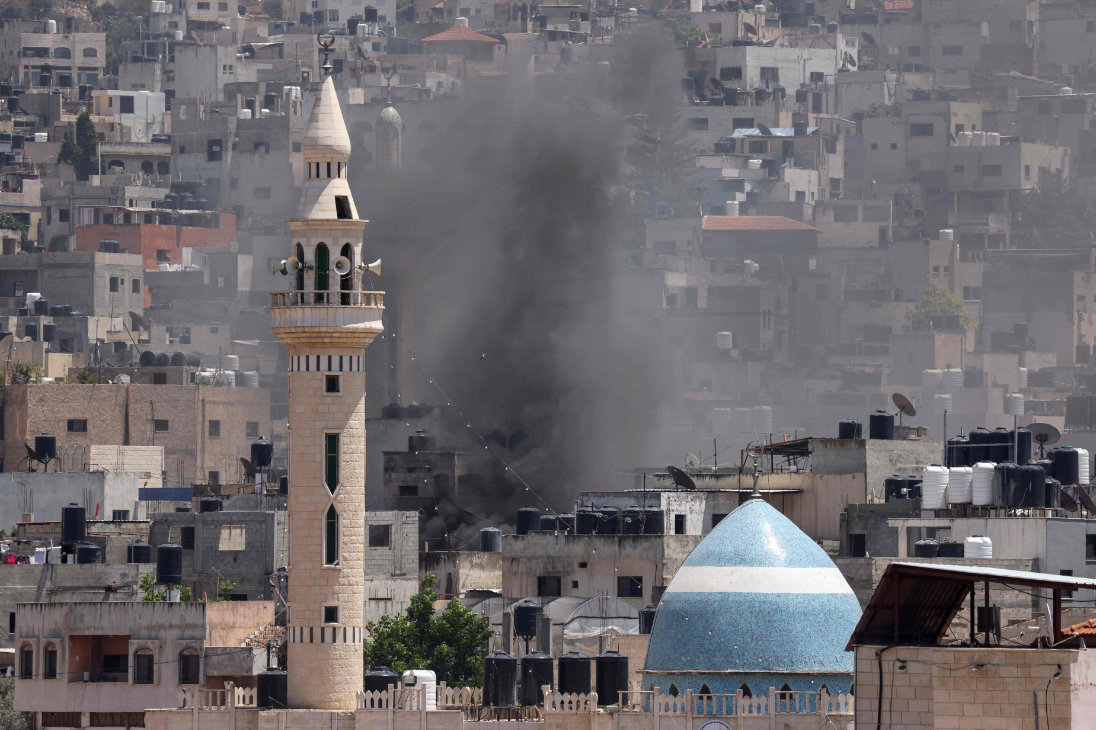
Clashes erupted in Jenin as Israel launched a massive military operation in the West Bank city on Monday, reviving memories of a similar ground offensive conducted 21 years ago. (AFP)
A spokesperson for Mahmoud Abbas, the Palestinian president, condemned the Israeli offensive as “a new war crime against our defenseless people,” adding: “Our Palestinian people will not kneel, will not surrender, will not raise the white flag and will remain steadfast on their land in the face of this brutal aggression.”
In comments on Twitter on Monday, Ahmed Aboul Gheit, secretary-general of the Arab League, said: “The bombing of cities and camps by planes and the bulldozing of houses and roads is a collective punishment and revenge that will only lead to further detonation of the situation.”
Lt. Col. Richard Hecht, a spokesman for the Israeli military, said the airstrikes were intended to “minimize friction” for the soldiers deployed on the ground. He added the operation sought to end a “safe haven mindset” in the refugee camps that he claimed housed 19 people suspected of attacks on Israelis.
Over the past 24 hours, more Israeli airstrikes have been launched and thousands of soldiers have been stationed in Jenin to try and seize weapons. According to Palestinian Ministry of Health officials, eight Palestinians have died and 50 have been injured so far.
The Israeli government of Prime Minister Benjamin Netanyahu claims the offensive is “dealing a heavy blow to terrorists in Jenin.” The Israeli military has issued no statement to indicate when its operation will come to an end, while Israeli army radio has said it involves 1,000 troops and dozens of drones and could last for days.
As the gun battle raged between Israeli troops and Palestinian fighters on Monday, the Jenin Brigades said in a statement: “We will fight the occupation forces until the last breath and bullet. We work together and are unified from all factions and military formations.”
FASTFACT
The Battle of Jenin left 50 Palestinian civilians and fighters and 23 Israeli soldiers dead in April 2002.
Prior to the Israeli assault, a rocket had been launched from the Jenin area toward an Israeli community and exploded soon after it was fired, according to video footage.
Tensions had increased in the area after an Israeli military operation on June 19 in Jenin turned deadly, with five Palestinians killed in a gun battle, one of whom was a 15-year-old Palestinian girl. Dozens more were wounded, according to Palestinian health officials.
Jenin and Nablus have been the two major targets of Israel’s Operation Breakwater, which was launched more than a year ago. The operation has seen nightly Israeli raids and some of the fiercest clashes in the occupied territories since the second mass Palestinian uprising or intifada.

Clashes erupted in Jenin as Israel launched a massive military operation in the West Bank city on Monday, reviving memories of a similar ground offensive conducted 21 years ago. (AFP)
The ongoing Israeli offensive is the most intense since the Battle of Jenin, which left 50 Palestinian civilians and fighters and 23 Israeli soldiers dead in the space of little over a week in 2002. Thirteen of the soldiers were killed in a single ambush while trying to negotiate the refugee camp’s booby-trapped streets.
The offensive began on April 9, 2002, as Israeli forces, backed by fighter jets, invaded the camp with more than 150 armored tanks and bulldozers. The assault was launched a few days after a Palestinian suicide bombing which killed 30 people during a large gathering for the Jewish holiday of Passover.
The ensuing clashes between Palestinian militants and Israeli troops went on for more than 10 days, razing a large section of Jenin town and leaving some 3,000 Palestinians homeless. Allegations surfaced of extrajudicial killings by the Israeli military and the final death toll is still not a settled debate.
The Israeli government at the time framed Operation Defensive Shield — the country’s largest military mobilization since 1967 — as a defensive measure and a response to suicide bombings inside Israel that collectively claimed 56 lives and left hundreds injured.
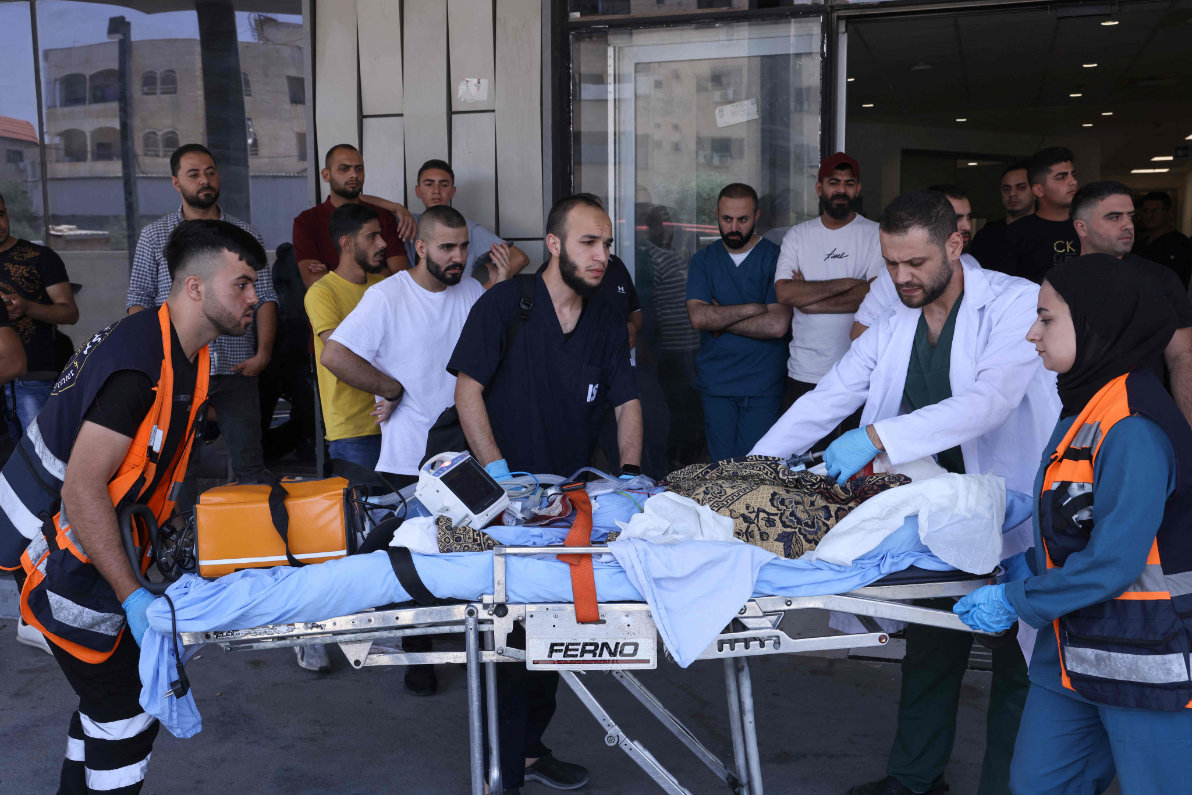
Palestinian medics transported an injured person into a hospital as Israeli forces began an assault on Jenin on Monday. (AFP)
In the period between the two offensives, successive Israeli governments, instead of treating the Palestinian Authority as a security partner, have taken actions that have weakened it. Simultaneously, far-right settler groups have accumulated political power in Israel at the expense of parties that support a two-state solution.
The upshot has been growing Palestinian disillusionment with the policies of the Abbas government and the increased popularity of armed groups in Jenin and Nablus, among other cities.
The past year, which has seen more than 140 Palestinian deaths, mostly in clashes or as bystanders, has proved to be the deadliest in more than a decade. Close to 30 Israelis have lost their lives during the same period.
The military operation in Jenin has so far received broad endorsement from Israelis, with even the centrist Yair Lapid voicing his support. “This is a justified step against a terror infrastructure based on accurate and high-quality intelligence,” he said on Twitter.
